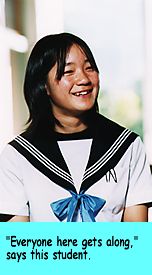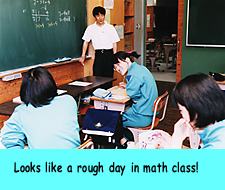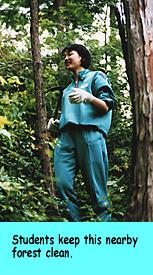 Classes at Otaki Elementary School begin at 8:55 a.m., but once a week pupils come much earlier to weed the schoolyard or shovel snow around the school. The Middle School starts 10 minutes earlier and ends 20 minutes later. Besides classes, the students are assigned to raise animals or grow vegetables. A
Day at School (Elem) <= |
Otaki
Elementary
and Middle School
|
|
|
|
||
A Day at School (Middle
School) 
Classes at Otaki Middle School begin at 8:45 a.m., 10 minutes earlier than the elementary school. Just like the lower grades, there are four lessons in the morning followed by two in the afternoon, but classes are five minutes longer, which means that the school day lasts 30 minutes longer.
|
||
 A
typical day for ninth graders starts with physical education (softball
or soccer), followed by social studies (how the National Diet operates),
English, and mathematics (quadratic equations). The afternoon is devoted
to scientific experiments and biology. Classes end at 3:10, but students
stick around to clean the school building. A
typical day for ninth graders starts with physical education (softball
or soccer), followed by social studies (how the National Diet operates),
English, and mathematics (quadratic equations). The afternoon is devoted
to scientific experiments and biology. Classes end at 3:10, but students
stick around to clean the school building.
Middle school students grow vegetables in home economics class. Among the many different vegetables raised are eggplants, tomatoes, cucumbers, and daikon (Japanese radishes). Sometimes, the children share their harvest with the cafeteria kitchen.
|
||
 For lunch, all the
pupils and teachers gather in the school's spacious cafeteria. Students
sit at tables arranged by school year. Students take turns setting tables,
wearing white aprons. The menu consists of daily specials and rice or
bread. Today's main dish is Chinese-style rice, steamed with an assortment
of meat, seafood, and vegetables, accompanied by consomme soup, salad
featuring bean-starch spaghetti, and a carton of milk. "Once a month,
we get to choose our own menu items. Next time I want to suggest ice cream!"
one student exclaimed.
For lunch, all the
pupils and teachers gather in the school's spacious cafeteria. Students
sit at tables arranged by school year. Students take turns setting tables,
wearing white aprons. The menu consists of daily specials and rice or
bread. Today's main dish is Chinese-style rice, steamed with an assortment
of meat, seafood, and vegetables, accompanied by consomme soup, salad
featuring bean-starch spaghetti, and a carton of milk. "Once a month,
we get to choose our own menu items. Next time I want to suggest ice cream!"
one student exclaimed.
|
||
 One way in which the lifestyle
of children at the Otaki School differs from that of city kids is the
way they spend their time after school. Rather than attending juku (cram
schools), Otaki students spend their time working up a sweat playing sports
or helping grow vegetables on the family farm. The skiing season lasts
from November to May, and some students spend almost every vacation day
on the slopes. "The last time I ate at McDonald's was a year ago," laughs
a ninth grade boy. Daily life in Otaki flows calmly and peacefully.
One way in which the lifestyle
of children at the Otaki School differs from that of city kids is the
way they spend their time after school. Rather than attending juku (cram
schools), Otaki students spend their time working up a sweat playing sports
or helping grow vegetables on the family farm. The skiing season lasts
from November to May, and some students spend almost every vacation day
on the slopes. "The last time I ate at McDonald's was a year ago," laughs
a ninth grade boy. Daily life in Otaki flows calmly and peacefully.
|
||
|
||
|
|
||

 The student union at the Otaki
School is quite active. There are seven divisions, including those for
administration, books, welfare, landscape gardening, and communications.
All 52 middle school students are involved in the union. Several activity
themes are chosen each July. One of this year's themes is volunteer
activities for Bangladesh. The students are thinking of collecting aluminum
cans and milk cartons, exchanging them at a recycling center for cash,
and making a donation through a village doctor who has done medical
work in the country.
The student union at the Otaki
School is quite active. There are seven divisions, including those for
administration, books, welfare, landscape gardening, and communications.
All 52 middle school students are involved in the union. Several activity
themes are chosen each July. One of this year's themes is volunteer
activities for Bangladesh. The students are thinking of collecting aluminum
cans and milk cartons, exchanging them at a recycling center for cash,
and making a donation through a village doctor who has done medical
work in the country.